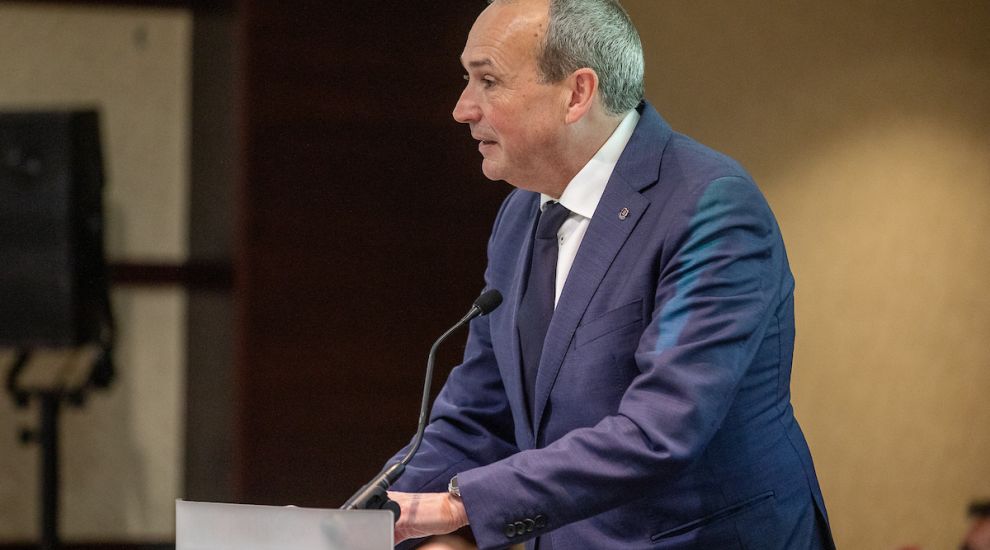


The Chief Minister made a bid to win the support of the business community yesterday with promises of restoring political stability, supporting a stronger workforce, and cutting red tape… but some leaders seemed unconvinced by his plans to transition to a Living Wage.
A "record crowd" of Jersey business leaders packed the Pomme D'Or Hotel yesterday lunchtime as Chief Minister Lyndon Farnham delivered his first speech to the Chamber of Commerce since being elected in January.
In a speech in which the words "confidence", "stability" and "support" appeared four times each, Deputy Farnham opened by speaking about the period of "economic upheaval and political unsteadiness" he inherited from the previous Government before repeating his plan to get "get back to basics" by prioritising issues like the cost-of-living crisis, affordable housing, and challenges with the healthcare system.
After listing the early actions taken by his Government, including the resolution of the teachers' pay dispute, the acquisition of Grève De Lecq, the "robust and respectful" debate on assisted dying, and GP fee reductions, Deputy Farnham turned his focus to "measures that will impact you specifically as business and community leaders".
The most significant of these were plans to raise the minimum wage to around two-thirds of median earnings by 2026, in a proposed transition to a living wage.
"I know this will not be an easy transition for everyone, but it is a change which will give help to those in our community who are struggling the most," said Deputy Farnham.
"And where it is needed, support will be provided to employers and employees during the transition period."
To facilitate the living wage transition, the Chief Minister said that up to £20 million will be allocated over the next two years to support productivity schemes across sectors like retail, agriculture and hospitality.
During a question-and-answer session following the speech, some leaders took the opportunity to robustly challenge his wage commitments in particular.
Jersey Chamber of Commerce CEO Murray Norton raised concerns about the "massive impact" that minimum wage hikes will have on the "cost bases" of businesses.
"If you take all of the minimum wage rises and include the new rise you are looking at a 69% rise in minimum wage since 2021," he said.
Deputy Farnham replied: "We are very alive to that... but we also need to be realistic about the cost of living.
"We are doing this to give people who need it most more financial security.
"Minimum wages are to protect against exploitation; living wages are to give people a slightly better standard of living.
"I'm sure all of us, notwithstanding our business challenges, will want to aspire to that."
Mr Norton also said that Deputy Lyndon Farnham had voted against any rise in the minimum wage for the past 20 years.
"Your politics have changed...would you agree with that?" the CEO asked.
In response, the Chief Minister said: "We live in different circumstances to when some of those votes were made.
"I think we need to learn how to adapt and I am particularly encouraged by the more representative Government we have because of the broad political spectrum that is covered there."
Deputy Farnham added that the policy will be "primarily aimed at people on the island to improve the standard of living" and that his economic advisors team are currently working to ascertain what that could look like.
When pressed for more detail on plans, Deputy Farnham said that the first step to increasing the minimum wage will be in the first quarter of 2025 when the hourly rate will be around the £13 an hour mark.
He said the next step will be in the first quarter of 2026 where the new minimum wage rate will be around the £14 mark.
One audience member expressed concerns about the potential negative impact of the new minimum wage on the economy – particularly in the tourism sector – and the possible job losses.
He said: "I have to say that I find it extraordinary that you're introducing a new minimum wage that is going to require the States to start putting £20 million back into the economy to soften the blow to certain sectors."
However, Deputy Farnham remained adamant the economy would restructure, businesses would adapt, and living wages were morally necessary to improve living standards.
He also said that he was "certain that local businesses will also welcome the removal of unnecessary bureaucracy and improvements in the ways they are required to deal with Government".
He said: "Over 80% of the recommendations [from the Barriers to Business report] are either completed, underway, or part of ongoing collaboration between Government and industry."
This report, released last December and conducted by Jersey Business, warned that failure to act on its suggestions could result in "reputational damage" and a "continuing downward economic trajectory" for the island.
Deputy Farnham also spoke about the Government's commitment to "skills development" through initiatives like promoting apprenticeships and sustainable student finance "to provide the future workforce for businesses".
Looking ahead, the Chief Minister underscored long-term challenges like the predicted decline in the working-age population that will require "careful workforce planning".
To address this, Deputy Farnham called on the business community to "work together" with Government and "have confidence in the future of our island".
The Chief Minister concluded with a promise that his Government would be "open and transparent" and would work harder to "engage, discuss and consult" in restoring public trust.
Pictured top: Deputy Lyndon Farnham at yesterday's Chamber Lunch captured by Gary Grimshaw. Find the full spread of photos in next month's Connect Magazine..
Comments
Comments on this story express the views of the commentator only, not Bailiwick Publishing. We are unable to guarantee the accuracy of any of those comments.